This piece is part of a series titled “Nonstate armed actors and illicit economies in 2024” from Brookings’s Initiative on Nonstate Armed Actors.
The situation in Haiti is more dire than ever. Killings and kidnappings reached their highest levels in 2023, doubling the toll of the previous year. Over the past several years, gangs in Haiti have grown in independence, strength, and geographic scope, while the Haitian National Police, outgunned and increasingly undermanned, have proven unable to stem the tide of their influence.
On October 2, 2023, nearly one year after caretaker Prime Minister Ariel Henry requested foreign support for his beleaguered country, the United Nations Security Council authorized a non-U.N. multinational mission, led by Kenya, to support the Haitian National Police. However, it remains unclear whether and when the mission will deploy, while personnel commitments by countries including Jamaica, the Bahamas, and Antigua and Barbuda have fallen far short of the force’s proposed 5,000 police officers.
Meanwhile, the political process to return Haiti to constitutional order following President Jovenel Moïse’s assassination in July 2021 has barely advanced. The government’s lack of legitimacy and the absence of political agreement are likely to significantly curtail the multinational mission’s ability to make a meaningful impact.
Expanding gang control
Without significant changes in the current situation, 2024 will likely see a continuation and expansion of recent gang dynamics.
In the absence of any restraint, the level of ambition and capacity of some gangs will continue to grow. The leader of the Village de Dieu gang, Izo, possesses a fleet of boats larger than the country’s coast guard, and the Haitian National Police are frequently outgunned in gang confrontations. Gangs have developed robust income streams from kidnapping, extortion, and trafficking that give them significant independence in relation to their former political backers.
Gangs have been expanding their activities outside Port-au-Prince and across Haiti, including into previously quiet areas. In the Artibonite region, traditionally Haiti’s breadbasket, gangs are attacking frequently and brutally and have joined forces to invade the country’s heartland, the previously safe area around the city of Mirebalais. Gangs have firm control of Port-au-Prince Bay’s northern edge and are seeking to expand along the bay’s southern stretch.
The city of Port-au-Prince has continued to see a narrowing of safe spaces as well as an erosion of what is considered safe. Gangs control all entrances and exits to the city, allowing them to encircle and cut off the city should an alliance like last fall’s short-lived gang-led Viv Ansanm (“Live Together”) initiative succeed in unifying them.
However, conflict between the two largest gang alliances, the G9 and G-Pep, is likely to continue, especially in the Cité Soleil slum. The killing of a major gang leader in the slum in November resulted in several rounds of fighting between the alliances, as well as within them, particularly the G9.
In recognition of the violence’s impact, the U.N. Security Council voted on December 8 to add four additional gang leaders to the U.N. sanctions list. However, the gesture’s impact will likely be limited, given that most gang leaders do not have international visas or assets that can be easily targeted. Despite the thoroughness of the Panel of Experts’ report, the Security Council declined to add to the list any Haitian political or business individuals credibly accused of backing, enabling, or profiting from gang activities, although bilateral sanctions levied by the United States, Canada, and others have targeted more than five dozen individuals for corruption, trafficking, and other crimes.
International intervention at last?
The escalating gang violence has engendered a level of weary acceptance among the Haitian populace that a new intervention is needed to restore order, despite the problematic legacies of previous U.N. peacekeeping missions and U.S.-led interventions.
Although the multinational mission received Security Council approval in October, Kenyan participation quickly met domestic opposition in the national court system, with the Kenyan High Court expected to finally issue a ruling on the deployment on January 26. The Kenyans have promised to deploy 300 officers as early as February, but it remains unclear when the bulk of the force will arrive and what exactly it will be doing. Moreover, human rights observers have raised concerns about the Kenyan police, who have been connected with human rights violations themselves.
Some preparations have been undertaken while waiting for the Kenyan High Court’s ruling, including visits for coordination, but the mission’s aims remain vague. The U.S. government has committed as much as $200 million to support the mission, but little progress seems to have been made on key aspects of the deployment, including the concept of operations. Some training has been conducted for the officers anticipated to deploy, but it has been based on U.N. training modules tailored for U.N. peacekeeping missions.
In addition, the fact that the force is deploying outside the U.N.’s labyrinthine but well-established process raises concerns about the force’s accountability as well as its logistics and administrative capacities. So far, the force’s goal seems to be following a proposal by the U.N. secretary-general to guard key infrastructure and transportation axes in order to free up the Haitian National Police to pursue the gangs. The refrain is that the operation will be Haitian-led — giving Haitians ownership of the intervention, but also meaning that the Haitian government will likely be the first to be blamed for any potential issues.
However, Haitian gang leaders are unlikely to hide in the face of the new threat. After years of nearly unfettered growth, including substantial earnings from kidnappings, extortion, and trafficking, as well as the build-up of reserves of arms and ammunition, Haiti’s gangs are stronger and more independent than ever.
The immediate deployment of the support mission, potentially as early as February, is likely to herald a somewhat quieter period in Port-au-Prince, as gangs gather information about the new deployment and assess their options. During this period, they may seek to test the new force’s strength, or initial tests may arise naturally as gangs continue their illicit activities.
The Kenyan police units identified for the deployment have robust experience with SWAT-style policing. Should the force prove itself able to resist and even fight back against gang violence, its presence may lead to limited gains in security. The Haitian National Police can field, at best, only 10,000 active-duty Haitian National Police officers; attrition continues to reach new highs, with more than a thousand police officers departing in 2023. If the force is able to reach its stated goal of 5,000 deployed police officers, it will increase the number of police active in Haiti by half. However, current commitments to the force represent half of this number, at best.
Moreover, continuing insecurity in the area around the police academy has led to repeated delays in the recruitment of new classes of cadets. If the Kenyan deployment can secure the police academy to allow training to resume, the institution could take its first steps toward rebuilding.
Ultimately, however, even should a Kenyan-supported Haitian National Police prove to be more effective at curbing gang activity, the gangs will not disappear. They will likely retrench and adjust their activities to the new security situation, pulling back into gang strongholds or expanding their activities in areas of the country outside Port-au-Prince, particularly if the multinational mission is unable to maintain a presence outside the capital. Moreover, the absence of the state in gang neighborhoods means that any real, long-term change in security will require a considerably larger and more robust effort, as well as the reinsertion of state services and expansion of livelihood opportunities, to truly alter the situation in the capital’s most impoverished neighborhoods.
Political impasse
Nevertheless, even if the Kenya-led mission succeeds in deploying, its impact will be negligible without progress on the political front. An agreement from December 2022 remains largely unimplemented. Following a series of negotiations mediated in 2023 by the Caribbean organization CARICOM, a delegation proposed a new transitional agreement in December 2023. However, the agreement maintains Henry’s position as the transitional prime minister, which Haitian opposition groups adamantly oppose due to a lack of legitimacy. Both sides, the prime minister and the Haitian opposition, blame the other for a lack of progress in negotiations.
Key international partners like the United States do not want to see a revolving door of caretaker leaders, a reasonable concern for a country that, over the past 200 years, has seen only a handful of heads of state complete their elected terms in a constitutional manner. Arguably, Haitian opposition groups would prefer Henry to remain in power rather than lose the chance to take the reins themselves. But at some point, Henry’s hold on power will weaken in the face of a lack of progress toward a transition, and it’s anyone’s guess what will happen then.
A new approach is needed. The United States and other key international partners must increase their pressure on Henry, as well as the opposition, to wholeheartedly engage in negotiations to install a government of national unity. Otherwise, progress is likely to remain out of reach, and efforts to restore security to the Haitian people will be hobbled from the start.
The Brookings Institution is committed to quality, independence, and impact.
We are supported by a diverse array of funders. In line with our values and policies, each Brookings publication represents the sole views of its author(s).
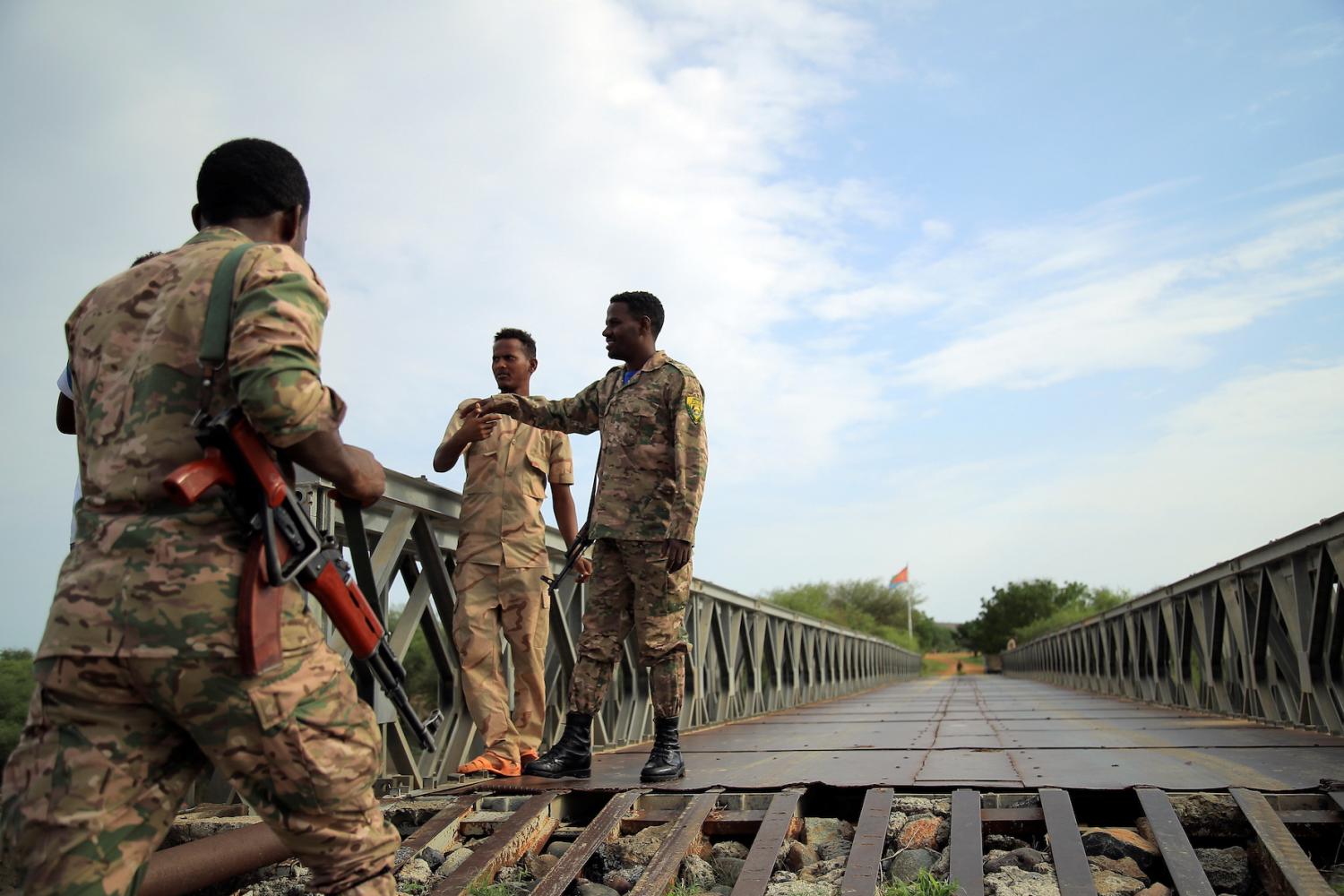


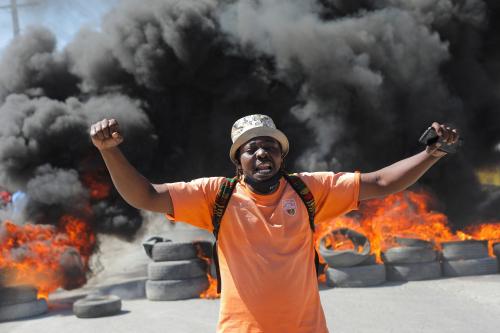
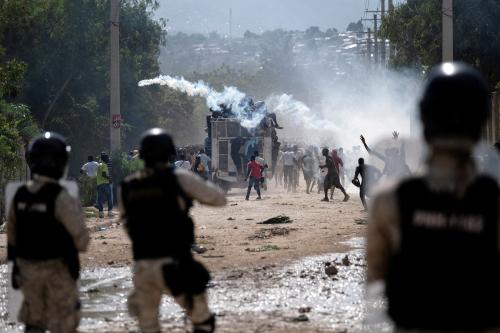
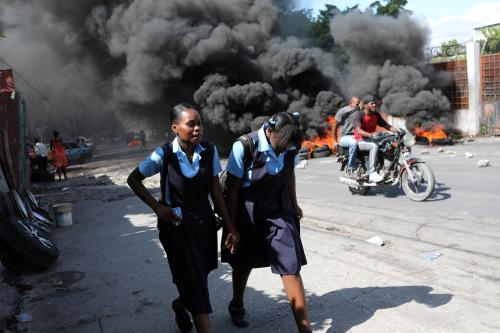

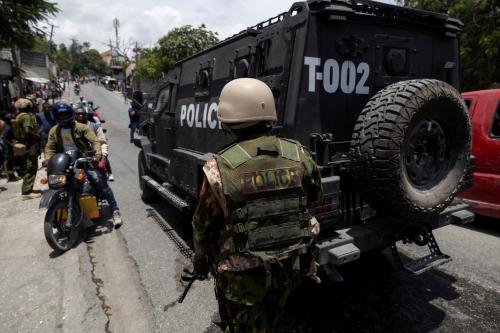
Commentary
Haiti’s struggle for safety and security will intensify in 2024
January 24, 2024